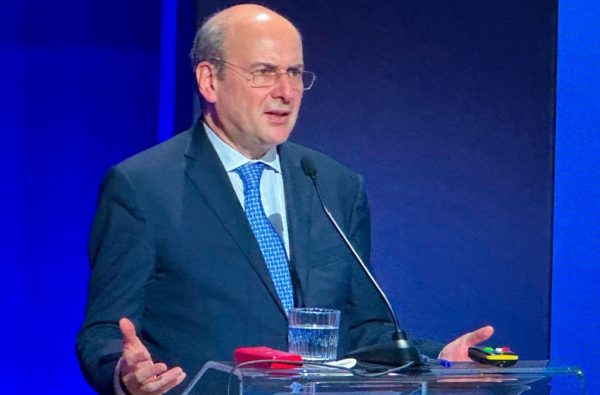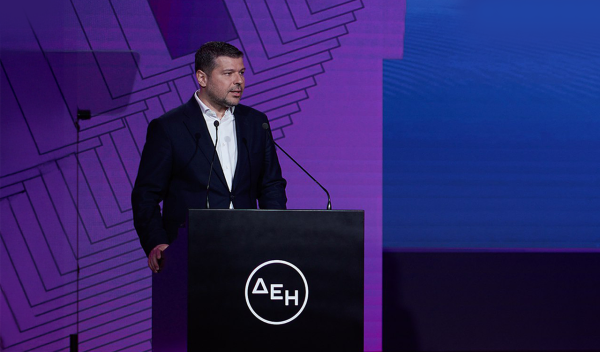
The mega Ultra Fast Broadband project is on it way for signature within the next few weeks, which will pave the way for 2023 for a series of vouchers that are set to boost demand for faster networks. With Greece remaining behind in Europe in fixed broadband access, in order to achieve the vision of the Gigabit Society by 2030 it will have to speed up the development of ultra-high speed networks.
The acceleration of digitization, which is strongly felt in everyday life, reaching 1 billion digital transactions between citizens and the state in 2022, brings the issue of penetration for very high speeds to the top of the agenda.
Summarizing the digital projects that have been auctioned in the last three years, in the context of SEPE’s Digital Economy Forum 2022, the Minister of State and Digital Governance, Mr. Kyriakos Pierrakakis, spoke of more than 220 major projects, totaling 2.3 billion. euros, over 400 million euros in aid, more than 700 million in PPPs. Within the first half of 2023, another €600 million in tenders is planned.
At the same time, telecommunications operators are also putting on the table new solutions that can strengthen Eurozonality, such as fixed wireless access (FWA). Essentially, it is a modern and short way to reach high speeds in remote and inaccessible areas.
As the president of the National Telecommunications and Posts Commission (EETT), professor Konstantinos Masselos, said in the context of the same forum, “given that the goal for connectivity in 2030 is technologically neutral, so we don’t only want optical fibers but also other technologies, equal opportunity must be given to fixed wireless access through the financing tools being designed.’
Vouchers for over 1 million households and businesses
With today’s household and business needs being boosted into the 100 Mbps realm, demand for the higher speeds offered by fiber to the home (FTTH), 5G, satellite access needs to be boosted to drive the growth of networks. Announced investments exceeding €5.6 billion by telecommunications providers are expected to significantly address the shortfall in ultra-high-speed infrastructure. However, the reduced commercial interest casts doubt on their investment plan.
This is why the voucher subsidy is one of the weapons used by the Ministry of Digital Governance to stimulate the market. About 140,000 households have been connected with fiber to the home to date thanks to the voucher of the Superfast Broadband (SFBB) program, the duration of which has been extended until 2022. At the same time, both the beneficiaries, including businesses, and the budget have been strengthened, reaching a total of 60 million euros.
The time for the large Ultra Fast Broadband (UFBB) PPP of 870 million euros (including VAT) which will cover more than 810,000 households and businesses with optical fiber seems to have arrived, with a delay of course of about a year. The signatures with the two contractors of the huge project, OTE and TERNA Energy – Grid Telecom, are expected in the next period. The new FTTH connections will be at least 100 Mbps, immediately upgradeable to 1 Gbps.
At the same time, the Gigabit Voucher Scheme is expected within 2023, which aims to make connections with a data download speed of at least 250 Mbps more accessible to consumers and businesses, also with the possibility of upgrading to 1 Gbps. The total budget of the action will amount to 100 million euros. As part of the action, the initial one-time connection fee will be subsidized, as well as part of the monthly fee for a period of 24 months.
Through the successful implementation of this action, as well as other related actions of the Ministry of Digital Governance, it is estimated that the penetration of ultra-high speed broadband services in the country may exceed 10%, supporting the sustainable development of the networks.
The initiative to wire buildings with fiber optics is also on track to be activated within the year. Through the Smart Readiness Voucher action, with a total budget of 148.4 million euros, which provides for a subsidy voucher, around 120,000 buildings are to enter the digital readiness phase, with resources from the Recovery Fund.
The second – even larger – phase of the UFBB is already being planned by the Ministry of Digital Governance, with a budget that will amount to 1.2 billion euros. The aim will be to cover about 1.7 million households and businesses that are not included in the providers’ investment plans.
The new fiber optic regulatory framework is moving forward
Meanwhile, a fortnight ago, it was approved by the European Commission the regulatory framework for fixed networks elaborated and submitted by EETT last November. The design may have been approved, with partial praise even from the Commission, but it is a new point of friction for the telecommunications market. This is because it is proceeding with a partial deregulation of OTE in the field of fiber to the home (FTTH), until the country reaches a penetration level of 30%.
Essentially, that is, EETT considers that this “relaxation” at the level of retail prices, as OTE will be free to configure FTTH packages without prior approval from the Commission, will favor competition, strengthening the development of networks. Of course, the reaction of OTE’s competitors, i.e. Vodafone and Nova, was strong from the start. They argue that this partial deregulation may lead to a distortion of competition in the Greek market, due to the dominant position of OTE.
However, as Mr. Masselos noted, the regulatory framework was approved exactly as it was submitted with particularly positive comments for three individual points, one of which is the exception for FTTH packages, which, however, does not concern wholesale. The Authority was also praised for the framework it designed for access to passive infrastructure, with the aim of reducing civil engineering costs in the development of networks, as well as for the detailed description of the process for “switching off” the copper network.
Latest News

Trump Tariffs Jeopardize Growth: Piraeus Chamber of Commerce
The tariffs, aimed at reducing the U.S. trade deficit, are expected to have both direct and indirect effects on the European economy

EU Condemns Trump Tariffs, Prepares to Retaliate
As tensions escalate, the EU is expected to continue negotiations with Washington while preparing for potential economic retaliation.

The Likely Impact of Trump Tariffs on Europe and Greece
Trump tariffs are expected to negatively affect economic growth in the Eurozone while Greece's exports could take a hit.

Motor Oil Results for 2024: Adjusted EBITDA of 995 mln€; Proposed Dividend of 1.4€ Per Share
Adjusted EBITDA for 2024 was down 33% yoy. The adjusted profit after tax for 2024 stood at 504 million euros, a 43% decrease from the previous year

Cost of Living: Why Greece’s 3% Inflation Is Raising Alarm
Greece appears to be in a more difficult position when it comes to price hikes, just as we enter the era of Trump’s tariffs.

Fitch Ratings Upgrades the Four Greek Systemic Banks
NBG’s upgrade reflects the bank’s ongoing improvements in its credit profile, Fitch notes in its report, including strong profitability, a reduction in non-performing exposures (NPEs), and lower credit losses

Trump to Announce Sweeping New Tariffs Wednesday, Global Retaliation Expected
With Trump's announcement just hours away, markets, businesses, and foreign governments are bracing for the fallout of one of the most aggressive shifts in U.S. trade policy in decades.

Inflation in Greece at 3.1% in March, Eurostat Reports
Average inflation in the eurozone settled at 2.2%, compared to 2.3% in February

Greece’s Unemployment Rate Drops to 8.6% in February
Despite the overall decline, unemployment remains higher among women and young people.

Jerry Kalogiratos Highlights Key Role of Energy Transition and Data Demand in LNG Outlook
Energy transition and the prospects of LNG were discussed at Capital Link’s 19th Annual International Maritime Forum, during a panel discussion with Jerry Kalogiratos (Capital Clean Energy Carriers Corp.)
























![ΕΛΣΤΑΤ: Αυξήθηκε η οικοδομική δραστηριότητα κατά 15,6% το Δεκέμβριο [πίνακες]](https://www.ot.gr/wp-content/uploads/2025/03/DSC9655-2-1024x569-1-90x90.jpg)

















 Αριθμός Πιστοποίησης
Αριθμός Πιστοποίησης